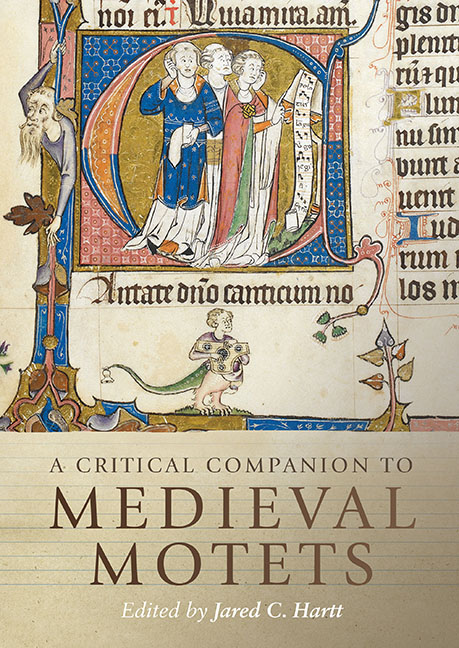Book contents
- Frontmatter
- Dedication
- Contents
- List of Figures
- List of Music Examples
- List of Tables
- List of Contributors
- Preface
- Acknowledgments
- Abbreviations
- Introduction: Approaching Medieval Motets
- 1 The Genre(s) of Medieval Motets
- 2 Origins and Interactions: Clausula, Motet, Conductus
- 3 Tracing the Tenor in Medieval Motets
- 4 Isorhythm
- 5 Notation
- 6 Thirteenth-Century Motet Functions: Views through the Lens of the Portare Motet Family
- 7 A Prism of its Time: Social Functions of the Motet in Fourteenth-Century France
- 8 Motets, Manuscript Culture, Mise-en-page
- 9 Clerics, Courtiers, and the Vernacular Two-Voice Motet: The Case of Fines amouretes / Fiat and the Roman de la poire
- 10 When Words Converge and Meanings Diverge: Counterexamples to Polytextuality in the Thirteenth-Century Mote
- 11 Motets in Chansonniers and the Other Culture of the French Thirteenth-Century Motet
- 12 Building a Motet around Quoted Material: Textual and Musical Structure in Motets Based on Monophonic Songs
- 13 The Duet Motet in England: Genre, Tonal Coherence, Reconstruction
- 14 Materia Matters: Reconstructing Colla/Bona
- 15 Machaut’s Motet 10 and its Interconnections
- 16 A Motet Conceived in Troubled Times: Machaut’s Motet 22
- 17 A Motet Ahead of its Time? The Curious Case of Portio nature/Ida capillorum
- Bibliography of Works Cited
- Select Glossary
- Index of Cited Motets
- General Index
- Studies in Medieval and Renaissance Music
7 - A Prism of its Time: Social Functions of the Motet in Fourteenth-Century France
Published online by Cambridge University Press: 21 October 2020
- Frontmatter
- Dedication
- Contents
- List of Figures
- List of Music Examples
- List of Tables
- List of Contributors
- Preface
- Acknowledgments
- Abbreviations
- Introduction: Approaching Medieval Motets
- 1 The Genre(s) of Medieval Motets
- 2 Origins and Interactions: Clausula, Motet, Conductus
- 3 Tracing the Tenor in Medieval Motets
- 4 Isorhythm
- 5 Notation
- 6 Thirteenth-Century Motet Functions: Views through the Lens of the Portare Motet Family
- 7 A Prism of its Time: Social Functions of the Motet in Fourteenth-Century France
- 8 Motets, Manuscript Culture, Mise-en-page
- 9 Clerics, Courtiers, and the Vernacular Two-Voice Motet: The Case of Fines amouretes / Fiat and the Roman de la poire
- 10 When Words Converge and Meanings Diverge: Counterexamples to Polytextuality in the Thirteenth-Century Mote
- 11 Motets in Chansonniers and the Other Culture of the French Thirteenth-Century Motet
- 12 Building a Motet around Quoted Material: Textual and Musical Structure in Motets Based on Monophonic Songs
- 13 The Duet Motet in England: Genre, Tonal Coherence, Reconstruction
- 14 Materia Matters: Reconstructing Colla/Bona
- 15 Machaut’s Motet 10 and its Interconnections
- 16 A Motet Conceived in Troubled Times: Machaut’s Motet 22
- 17 A Motet Ahead of its Time? The Curious Case of Portio nature/Ida capillorum
- Bibliography of Works Cited
- Select Glossary
- Index of Cited Motets
- General Index
- Studies in Medieval and Renaissance Music
Summary
IN AN OFFICIAL LETTER in 1346, King John of Bohemia, Count of Luxembourg, absolved the Dominican order of an old allegation that they had murdered his father, Henry VII, Emperor of the Holy Roman Empire, by poisoning the Mass wine during communion. The crime would have taken place at Buonconvento near Siena in 1313, in the midst of a campaign during which the emperor intended to unite the warring city-states of northern Italy under the imperial crown. John's letter, written in the year of his own death in the battle of Crécy, mentions the romancij, chronicae & moteti (romances, chronicles and motets) that had been composed in response to his father's alleged murder. One such motet, Scariotis falsitas/Jure quod in opere/Superne matris gaudia, survives as the fifth musical piece in the Roman de Fauvel (Fauv). Its texts proclaim the wickedness of the Dominicans and the horror of their crime. Many of the motets in Fauv criticize the clergy and the mendicant orders; even the pope himself (at that time Clement V, the first of the Avignon popes) is accused of currying favor with the monstrous Fauvel who aspires to dominate the world. Pope Clement had initially supported Henry's enterprise in Italy but, at the instigation of King Philip the Fair of France, had abandoned his cause. Philip's past reign and his evil counselors are likewise heavily criticized in Fauv. Thus, the motet places us in the midst of the political turmoil in France and Italy at the beginning of the fourteenth century. Since the manuscript probably originated in circles of French court officials, and since John of Bohemia, who was a long-standing friend of the French royal house (and, incidentally, Guillaume de Machaut's first patron), often sojourned in Paris, he may have known or heard the motet about his father's death. John's rejection of the accusation came no less than thirty years after the alleged murder, so he too may have initially given credence to the allegation uttered in the motet.
Scariotis falsitas/Jure quod in opere reveals one of the newer functions of the motet during the fourteenth century, beyond the traditional concerns with amorous and devotional subjects. In the previous century, political topics were more proper to the conductus, although there are some thirteenth-century motets criticizing the hypocrisy of the clergy.
- Type
- Chapter
- Information
- A Critical Companion to Medieval Motets , pp. 155 - 174Publisher: Boydell & BrewerPrint publication year: 2018

